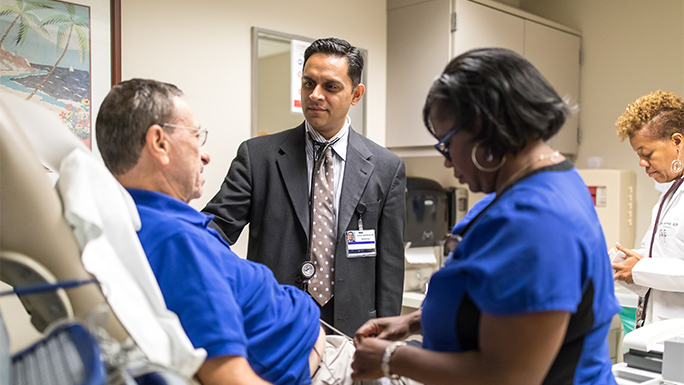Pacemakers, Defibrillators & Heart Monitoring Devices

Many types of small, implantable devices can be used to monitor and treat fast, slow and irregular heart rhythm problems. University of Chicago Medicine heart rhythm experts are leaders in the use of these life-saving devices. With decades of experience, our physicians have the skill our patients can trust, and our access to the newest technology ensures we can select the right device for each patient's specific condition.
Heart Monitoring Device Implantation
Devices are implanted in our state-of-the-art electrophysiology lab, which features the latest advancements and leading-edge equipment. Implanting pacemakers and defibrillators requires the insertion of an electrical lead or wire into the heart. This lead is threaded through a large vein and is positioned into the heart’s upper and/or lower chamber and attached to a device called a pulse generator. The entire system is placed in a pocket that is created under the skin and soft tissue, usually just below the collarbone. When the heart rate is too slow, these devices send low-energy electrical current through the leads and to the heart muscle to pace the heart, stimulating the muscle to contract. Defibrillators are capable of delivering a high-energy shock to the heart when the heart rate is dangerously fast and chaotic.
Unlike pacemakers or defibrillators, insertable cardiac monitoring devices do not have any wires. These devices are placed just below the skin of the chest. The newest models are injectable and have a three-year battery life.
Heart Monitoring Devices Options We Offer
Pacemakers are small, electronic devices used to treat excessively slow heart rhythms (bradycardia). Pacemakers send signals to heart muscle that cause the muscle to contract at the correct pace, ensuring blood is pumped properly through the body. Today's advanced pacemakers adjust heart rates according to changes in the body's activity level, meaning the pacemaker regulates the heart's rate when the person is resting or exercising.
Defibrillators, also called implantable cardioverter defibrillators (ICDs), continuously monitor the heartbeat and are ideal for people who have life-threatening abnormal heart rhythms or those with a high risk for cardiac arrest. When a dangerously fast heart rhythm occurs, the device is triggered to deliver either rapid pacing or a life-saving, high-energy electrical shock to restore proper heart rhythm.
ICDs may also be appropriate for people with an increased risk of a cardiac arrest based on any of the following criteria:
- People who have had heart attacks, have a cardiomyopathy (low ejection fraction or EF) or have congestive heart failure.
- People diagnosed with ventricular tachycardia, ventricular fibrillation or other disorders that predispose them to inherited arrhythmias (Long QT syndrome, Brugada syndrome, cardiac sarcoidosis)
- Survivors of cardiac arrest
- People with certain forms of inherited heart disease, such as hypertrophic cardiomyopathy, or who have a family history of sudden cardiac death
Normally, the left and right ventricles — the lower chambers of the heart — contract at the same time. Heart failure can disturb the heart's normal electrical pathway, causing uncoordinated, "asynchronous" pumping of the ventricles, further decreasing the heart's ability to properly pump blood. This defect of the heart's electrical system is called left bundle branch block and is common in patients with congestive heart failure.
The biventricular pacemaker has three leads, one for the right atrium, one for the right ventricle and one that is placed in a vein on the surface of the left ventricle. The biventricular pacemaker stimulates the ventricles to contract together. This treatment is called cardiac resynchronization therapy (CRT). When coupled with a defibrillator, this therapy is called cardiac resynchronization therapy with a defibrillator or CRT-D.
At UChicago Medicine, electrophysiologists work side-by-side with the heart failure care team to identify patients who may benefit from cardiac resynchronization therapy. Over 70 percent of patients who are candidates for CRT can expect to see benefits including an improvement in symptoms, less heart failure hospitalizations, better quality of life and longer survival rate.
An insertable heart monitoring device is used to detect heart rhythm-related episodes of unexplained fainting (syncope) or palpitations. It is especially useful to diagnose atrial fibrillation (AF).
An insertable heart monitoring device continuously monitors heart rhythm and records your heart's activity in the form of an electrocardiogram (ECG). When a fainting episode occurs, the device is triggered to save a record of the heart's activity before, during and after the spell. The device can be programmed to automatically record the episode or it can be prompted to save the ECG via a small hand-held device placed over the cardiac monitor. Our electrophysiologists can then read the ECG record to determine if an arrhythmia is present.
Other types of heart monitoring devices such as Holter monitors and event recorders are worn outside the body and are designed for more short-term use. An insertable cardiac monitoring device can be in place for up to three years, increasing the chances of documenting an infrequent fainting spell.
Arrhythmia Treatment Options
Nationally Ranked in Cardiology, Heart Surgery and Vascular Surgery

Find an Arrhythmia Location Near You
Request an Appointment
To speak to someone directly, please call 773-702-9461. If you have symptoms of an urgent nature, please call your doctor or go to the emergency room immediately.
* Indicates required field
